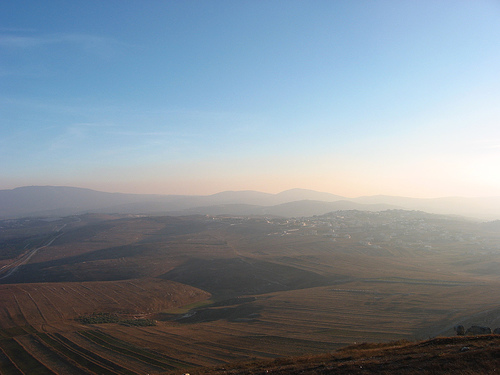- By Mark Lavie The Guardian, Sunday June 17, 2007

- Photo: Stefan Christoff, South Lebanon, 2005
JERUSALEM (AP): Militants in Lebanon fired at least two rockets into Israel on Sunday, causing no casualties and little damage, but raising the possibility of a new flare-up on the volatile border less than a year after Israel’s bloody month-long war against Hezbollah.
The Lebanese prime minister said the attack was geared at undermining the stability of Lebanon, while the U.N. condemned Sunday’s incident as a serious violation to a cease-fire that ended the conflict last year.
Hezbollah, a Lebanese militant group, denied involvement, leading to speculation a radical Palestinian group was behind the attack. Israel’s initial reaction was muted, but security officials were meeting to debate a response.
The rockets were the first fired from Lebanon since last summer’s war, when almost 4,000 rockets exploded in Israel. The latest rockets landed in the northern town of Kiryat Shemona, which was hard hit during that conflict.
The attack came as Israeli Prime Minister Ehud Olmert was arriving in the United States for talks. In New York, an official with Olmert said the prime minister was briefed about the incident.
“Israel will not succumb to this provocation but will monitor the situation carefully,” the official said, requesting anonymity because of the sensitivity of the situation, and indicating that Israel would not hit back.
Al-Manar, the Hezbollah TV station in Lebanon, broadcast a denial that Hezbollah was involved.
Lebanese Prime Minister Fuad Saniora said the attack aimed to destabilize Lebanon by casting doubts about the ability of the army and U.N. peacekeepers to protect the border zone.
“The state … will spare no effort in uncovering those who stand behind this incident, which is aimed at attempting to undermine the stability” of Lebanon, Saniora said in a statement.
A Lebanese security official told The Associated Press that two 107 mm rockets were launched using timers from an area between the villages of Adaisseh and Kfar Kila, a few miles from Israel’s border. The official spoke on condition of anonymity because he was not authorized to talk to the media.
The Lebanese army said in a statement three 107 millimeter Katyusha rockets were fired at Israel by “unknown elements” and that a search was underway to find the attackers. Troops sent to search the suspected launching area found a fourth rocket equipped with a timer.
Israeli Channel 2 TV’s Arab affairs analyst, Ehud Yaari, said a splinter Palestinian group in Lebanon was probably behind the attack. There was no word from either side about which group might be responsible, and no claim of responsibility.
In the past, small Palestinian groups, like the Popular Front for the Liberation of Palestine, have fired a few rockets at Israel.
Yasmina Bouziane, a spokeswoman for the U.N. Interim Force in Lebanon, said the rocket attack was considered a “serious breach of cessation of hostilities agreement” from last year’s war.
UNIFIL and Lebanese troops have intensified patrols of the area “in order to locate the perpetrators and prevent any further attacks,” she added.
The peacekeeping force urged the parties to exercise maximum restraint to prevent escalation.
Late Sunday, a drone aircraft could be heard circling over the southern Lebanon port city of Tyre, witnesses said. UNIFIL and the Lebanese army have no drones, and Israel has frequently flown such small aircraft to monitor movements on the ground in southern Lebanon.
The 2006 conflict started with a cross-border raid by Hezbollah in which three Israeli soldiers were killed and two captured. Israel launched an air offensive against Hezbollah targets and Lebanese infrastructure. The war ended inconclusively after 34 days.
Associated Press Writer Hussein Dakroub contributed to this report from Beirut, Lebanon.


